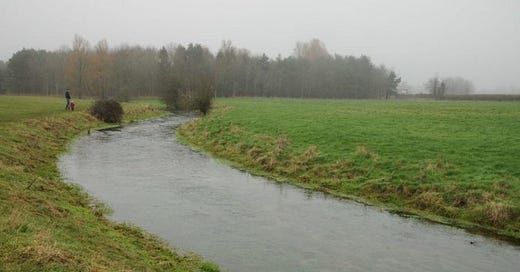Was there ever ‘shareholder support’ for Thames Water?
CHALLENGING CORPORATE POWER: Stanley Root’s analysis of Thames Water’s accounts shows that there has never been a year since privatisation when shareholders contributed more cash than they took out.
by Stanley Root, West England Bylines
When discussing negotiations between Ofwat and shareholders, the following phrase is often used:“Thames Water shareholders refuse to invest more money.” This is highly misleading. It implies that, since privatisation, generous shareholders have repeatedly invested money into Thames Water, as and when required, to support its operations. But now, thanks to the meddling of campaign groups like Windrush Against Sewage Pollution (WASP) and the obstinacy of Ofwat, they have finally lost their patience and their generosity.
Nothing could be further from the truth.
There has never been a year since privatisation when shareholders contributed more cash than they took out. In the year of privatisation, investors paid around £860mn for Thames Water, of which £360mn went into Thames Water share capital and the rest to the then Conservative government. But, that same year, Thames paid a cash dividend of £440mn (Thames Water Utilities Limited (TWUL) Financial Statements 1991, page 10). Net cash impact on Thames Water for the year – negative £80mn.
The wheeze was repeated in 1996. Some £500mn in cash was injected as share capital but £648.7mn taken out as dividends (TWUL Financial Statements 1996 page 46). Net cash impact – negative £148.7mn. Again in 1998, £269mn share capital was injected but £651.5 million taken out in dividends (TWUL Financial Statements 1998, page 47). Net cash impact – negative £382.5mn.
Under investment bank Macquarie’s guidance, share capital was reduced by £1bn to the low level at which it stands today, just £129mn (TWUL Financial Statements 2013, page 87, and 2023, page 122).
But what about shareholder equity?
Shareholders may try to dismiss this and say that the real measure of shareholder support is total shareholder equity. All the profits of Thames belong to shareholders, and they have every legal right to withdraw 100% in dividends each year. If they generously choose to leave 10% of profits in the company to support its operations that is just as much shareholder support as contributing share capital. For shareholders, “not taking is a form of giving”.
That is a fair point. So, let’s look at the history of shareholder equity, restated for retail price inflation during those 34 years. In March 1990, total equity was £1.3bn (TWUL Financial Statements 1990, page 8) – equivalent to £3.9bn in March 2023 prices. But equity in March 2023 was just £1.4bn, a decline in real terms of two thirds. More than 80% of this equity is £1.2bn cash owed by parent company Kemble Water Holdings Limited (KWHL), which is itself in financial difficulties with negative equity of £329mn (KWHL Annual Report 2022/23, page 41) and not enough cash even to pay upcoming £190mn interest payments.
So, also at the level of shareholder equity, we can see Thames Water has seen no benefit of shareholder support over the years, just cash extraction each and every year for 34 years. In the last six years the dividends paid to the parent company were between £33mn and £60mn.
But what about the billions which shareholders have invested in infrastructure?
For example, Macquarie claims in its August 2023 factsheet (page 3), that they “supported the company to invest over £11bn in its network”. Note the careful use of words. They did not say they invested directly into the network. They “supported the company”. This is what they did: they took £11bn cash from customer billings and used it to buy fixed assets. Meanwhile Thames Water’s net debt increased by £7.2bn (TWUL Financial Statements 2007, page 57, and 2017, page 143), not to invest in the network, but to enable its parent company to pay dividends, pay off interest on the original debt used to buy Thames Water in 2006, and pay down around £2bn of that original debt.
But what about the huge amounts paid by shareholders?
German utility company RWE paid £3.8bn to buy Thames in 2000, Macquarie paid £4.8bn (KWHL Financial Statements 2007 page 33) to buy Thames in 2006 and current shareholders paid several billions for their shares (actual amounts not divulged by Macquarie). These are indeed huge amounts of money, but they never benefited the cashflows of Thames Water. These huge sums were paid by one group of investors to another group of investors for the privilege of extracting cash from Thames Water with a healthy return guaranteed by the UK government and Ofwat, and with no requirement to inject any more cash into the business.
This is no different from London landlords flipping a crumbling Victorian terraced house for big profits as the property market rises, while the house itself remains in a pitiful state of repair.
So can commentators, journalists, politicians, company spokespeople, Ofwat and, most importantly, the general public, please refrain from using the phrase: “Thames Water shareholders refuse to invest more money”. Say it like it is. Shareholders have never once put cash into Thames Water’s business since the day of privatisation and they have no intention of changing the habit of a lifetime. Or for brevity:
“Shareholders continue their 34-year policy of refusing to support Thames Water financially”.
Please not that this article first appeared in Windrush Against Sewage Pollution (WASP) as the blog ‘Predators or parasites? Certainly not investors’.




